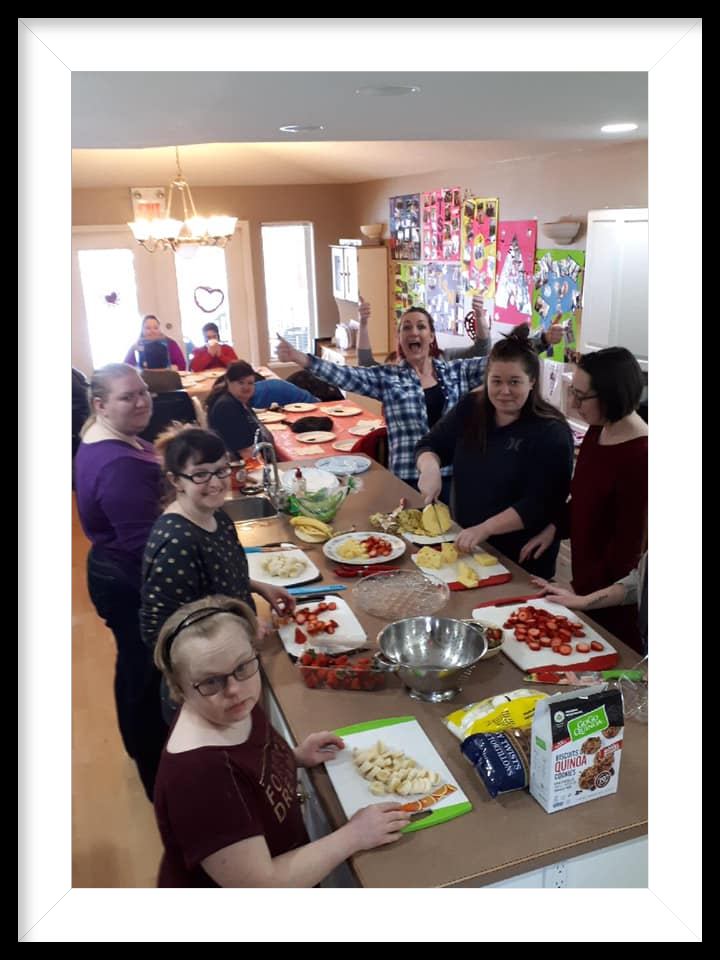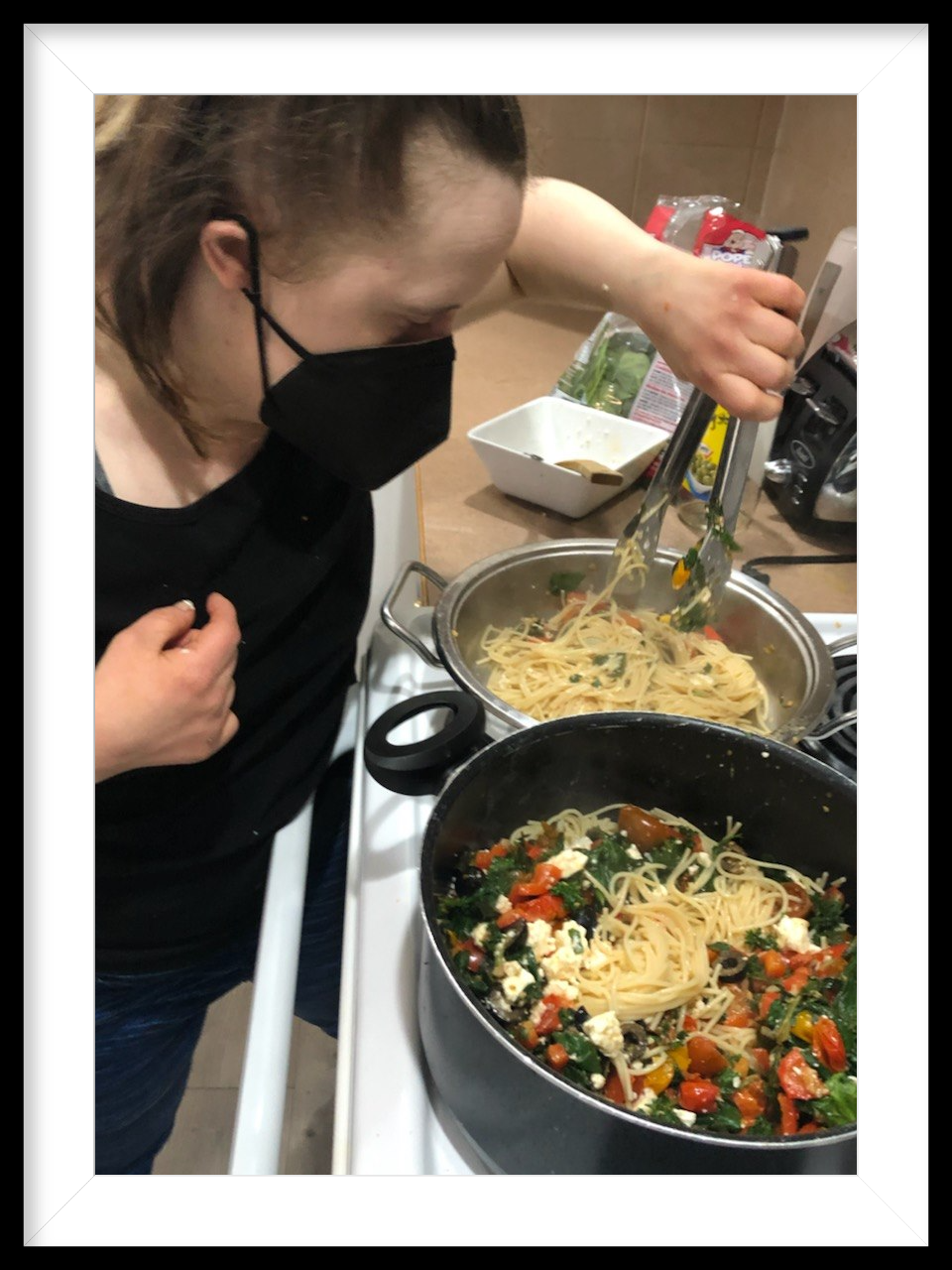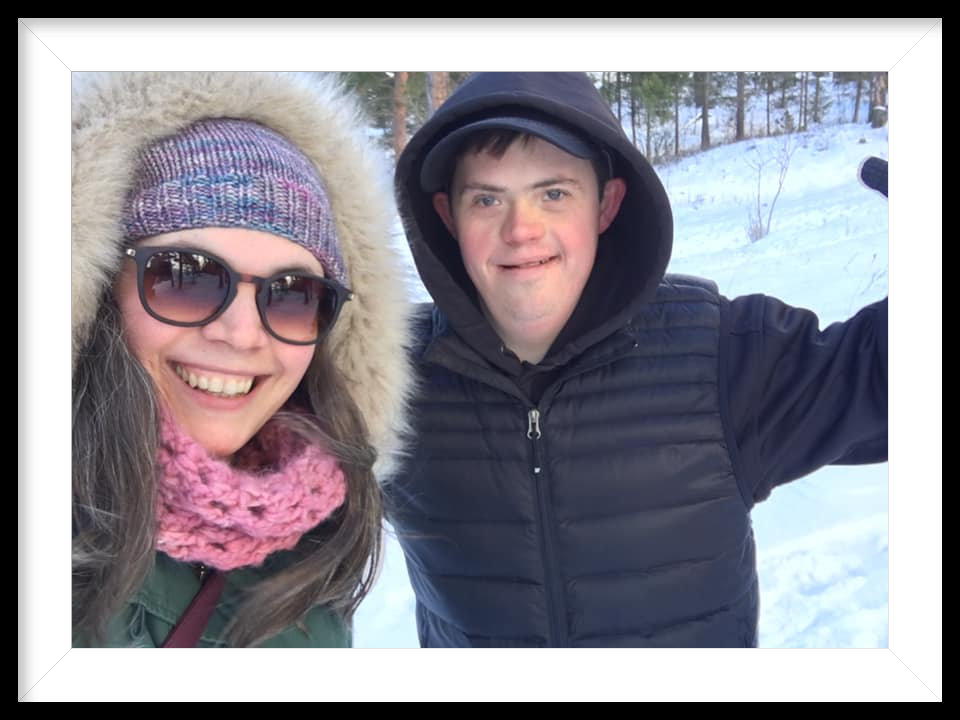
RIGHTS FOR INDIVIDUALS
All individuals receiving services have:
- The right to be informed
- The right to receive information in words that one can understand and the right to always know what one is signing.
- The right to choose.
- The right to make informed choices about all things that affect one's life and the right to take the time needed to decide what one really wants.
- The right to make mistakes.
- The right to use information resulting from the choices one has made.
- The right to disagree with something, someone, and/or a service that one does not like.
- The right to be heard.
- The right to assistance and the right to access generic community supports, for example, legal aid, police, etc.
- The right to be free from abuse and to seek help without fear of punishment. (Abuse can be physical, verbal, psychosocial, financial, and sexual. Other abuses can be in the form of over or under medicating, neglect, and the violation of rights.)
- The right to self-determination.
- The right to give input into the planning processes that affect one's life.
- The right to the least restrictive and most effective teaching models and settings based on one's individual skills and needs.
- The right to required medical services.
- The right to choose one's own doctor/specialists and the right to understand medical treatment plans.
- The right to emotional and psychological supports (formal and informal).
- The right to privacy when one is receiving such support.
- The right to attend religious services of one's own choosing.
- The right to choose one's friends and the times one wishes to socialize with them.
- The right to have friends in one's home and to have private time when meeting with them (including telephone conversations).
- The right to optimal independence in health, hygiene, and grooming practices.
- The right to receive or prepare three nutritionally balanced meals daily based on personal and cultural preferences.
- The right to a personal living area that is comfortable and safe.
- The right to decorate one's own living space.
- The right to responsible use of personal possessions such as: books, radios, toiletries, jewelry, cigarettes, alcohol, etc. and the right to control access to those possessions.
- The right to privacy. All Canadians have a right to privacy. Laws such as the Privacy of Information and Protection Act ensure the privacy of each individual is protected.
- The right to send and receive mail.
- The right to earn money and to receive eligible allowances that one is entitled to.
- The right to choose where one wants to live.
- The right to live in the community of one's choice and to be given the support needed within that environment.
- The right to vote.
- To refuse any service, intervention, or medication (unless mandated by law or court order).
- To participate in decisions about services provided.
- To receive service that is non-coercive.
- To receive service that is free from discrimination.
- To view their own individual personal file.
- To provide feedback about services that are received and about Access Resources.
- To make a complaint about services received.

INDIVIDUAL RESPONSIBILITIES
As with all rights, there are always responsibilities. All individuals receiving services have the responsibility:
· To consider the respect and dignity of all their peers at Access Resources.
· To advise Access Resources when unable to participate in a program
· To take responsibility for reactions towards others, as well as interactions
· To inform the Program Director at Access Resources if they feel that they have been treated unfairly
PROFESSIONAL ETHICS
Access Resources employees sign a Professional Ethics Agreement upon hiring and every year after. This addresses how employees will interact with individuals, families, colleagues, and other stakeholders, etc. The agency's priority is to ensure ethical service delivery. The Professional Ethics Agreement provides a common foundation to all agency decision-making and professional relationships and is the foundational document for all policies and procedures.
QUALITY OF LIFE FRAMEWORK
| FACTOR | DOMAIN | EXEMPLARY INDICATORS |
| Independence | Personal Development | Personal Skills Adaptive Behavior |
| Self Determination | Choices Decisions Autonomy Control | |
| Social Participation | Interpersonal Relationships | Social Networks Social Activities Friendships |
| Social Inclusion | Involvement in Community Community Roles | |
| Rights | Equal Opportunities Respectful Treatment Legal access and due process | |
| Well-being | Emotional Well-being | Safety & Security Positive experiences Success |
| Physical Well-being | Health & Nutrition Status Recreation & Physical Exertion | |
| Material Well-being | Income Possession |
ABOUT OUR SERVICES - ACCESSING SERVICES
Eligibility
Eligibility is determined by Community Living BC (CLBC).
Referral
The purpose of a referral is to give eligible individuals extra support in the community to achieve a higher quality of life. An individual's facilitator will refer an individual who meets CLBC eligibility requirements to a program at Access Resources depending on their needs and their goals and whether or not Access Resources can meet those goals through one-to-one support or through a group setting. Access Resources does not refuse any individual participation in any programs.
Intake
The purpose of Intake is to get to know the individuals, their support team and to determine what their needs and goals are for attending Access Resources programs. During the Intake process, a staff doing the intake will provide to individuals and their support team a booklet of information needing to be signed relating to programs, their rights and responsibilities, consent forms, risk assessments, medical history and support needs that staff may need to know for when the individual is attending program. Access Resources staff then ask individuals if they have any program suggestions so that, as their support team, we can help with meeting their needs. If individual's needs require a one-to-one support worker, they can attend programs (i.e.: TSN if referred) with their support staff. When Individuals who want to attend program but have high needs and do not have a one-to-one support worker, we cannot jeopardize the health and safety of other program participants. If group numbers are low and/or depending on staff availability, we are able to be flexible and offer the support needed for the individual with high needs.
Goal Setting/Service Accountability/Individual Personal Plan (IPP)/Personal Life Plan (PLP)
The purpose of Goal Setting/Service Accountability/Individualized Personal Plans (IPP)/Personal Life Plans (PLP) is to constantly and consistently evaluate individuals within our programs and determine if they are meeting their goals and to change those goals if their needs have changed. Everyone that we support has a document (IPP or PLP) which clearly identifies their goals and outlines how, with the support of staff, they are going to meet them. Goals are re-evaluated bi-annually for IPPs based on percentages, and annually for PLPs. IPPs are submitted to CLBC to monitor the progress of our individual clients that Access Resources' supports. PLPs are provided to individual's support networks as per their preference and request.
Exit Criteria/Non-Utilization
The purpose of the Exit Criteria/Non-Utilization process is to record and constantly assess the attendance of programs offered at Access Resources so that individuals who are waiting through the request for service list are able to access supports in a quick and timely manner. The reasons that individuals may stop attending a program are many. When individuals stop attending program, staff are required to fill and send out a Non-Utilization Form. A Non-Utilization Form is sent by mail or email at 6 (six) weeks after an individual as not attended a program. If Access Resources does not receive a response within 2 (two) weeks time, they are exited from the program to allow space for individuals waiting to enter the program. If an individual requests to be exited from the program and exit survey will be given to them to determine their reasons for wanting to exit the program and given additional reference options for accessing other supports either within the agency or within the community. Individual files are kept a minimum of least 3 (three) years after an individual exits from a program at Access Resources.
SERVICE DELIVERY HOURS
Access Resources main office hours are typically 8:30 a.m. - 5:00 p.m. Monday to Friday. However, we can make exceptions based upon individual's needs, likes and Individual Contracts.
Some Programs run later in the day, based on specific activities (TSN, Men's Group) - See Program Calendars for more information.
Access Resources is closed on all Statutory Holidays (ie: Easter, Thanksgiving, Christmas, etc.). Any hours that are scheduled on a Statutory Holiday are not banked or carried over. The office Programs are closed the week between Christmas and New Years. For a full calendar of closures for the current year, visit our Home Page. They are listed at the bottom of the page.
If you need to cancel your supports/services, please call the office with as much notice as possible so we are aware for scheduling purposes.
DRIVING TIME
Driving time to and from your home will be included in your support time. We encourage families and home share providers to drop off and pick up or use handy dart to maximize the direct support time and minimize the amount of driving required by staff.
All meetings (goal planning, IPP's etc.) are also included in your support time.
PROGRAM FEES AND COSTS
There is no cost/fees to receive Access Resources services, but there could be costs/fees associated with specific programs based upon activities for the day (i.e., TSN, MAC, Men's Group, Ladies' Day, etc.).
Staff are not reimbursed for activities such as: bowling, eating out, movies, coffees out, etc.). We encourage all individuals to pack their own lunches and dinners or pair up with another individual when engaging in activities that have a fee/cost associated with it.
PETTY CASH
Access Resources provides a secure space to store individuals' petty cash. If an individual wishes to keep petty cash at the office, their funds will be kept in a separate wallet and a balance sheet is maintained for each month. At the end of the month, a copy of the balance sheet and receipts for the month is sent home with each individual. Families and Home Share Providers can then top up funds when necessary. We as that petty cash top ups be in smaller bills (i.e. $5.00, $10.00 or $20.00). You will be given a receipt for all funds received.
PERSONAL BELONGINGS
Access Resources does its best to make sure personal belongings are safely accounted for with each individual. However, we ask individuals to only carry with them the necessary items for the day. We ask that individuals please keep non-essential items such as (electronics, iPad's, Tablets, iPod's, extra money/gift cards, etc.) at home and not bring it to the office so they don't get misplaced, stolen or damaged.
We ask that individuals please keep their belongings/backpacks etc. in the front closet and you can ask a staff or Coordinator to safely store wallets or purses during programs.
It is also recommended to label all your belongings (clothes, backpacks, jackets, hats, mitts, etc.) with your name and phone number.
Access Resources is not liable or responsible for lost or stolen items. It is the responsibility of each individual to take care of their belongings. Staff will help you do this by reminding individuals to collect their belongings at the end of each day and to ensure that they are safely stored when they are at the office.
PERSONAL INFORMATION AND RECORDS
Access Resources keeps all information for Service Recipients in a safe and private area. This information can only be accessed by Employees. The information we keep on file includes:
- Health and Safety information
- Address and Contact information
- Assessments & Reports
- Meeting minutes
- I.P.P.'s (Goals)
- Incident Reports
SERVICE RECIPIENT FILES
Access Resources will maintain and safely store all files for Service Recipients. Service Recipients have the right to access their files and if you wish to do so, you need to put it in writing to the responsible Program Coordinator. You will then be provided with an appointment to view the file within 5 (five) business days of receiving the request. Individual files cannot be removed from the main office.

IF YOU ARE SICK OR AWAY
If you can't attend your supports or are away because you are sick (exhibiting flu or cold symptoms: fever, cough, runny nose, vomiting or diarrhea) or away on a holiday, please call the office to let us know or let your worker know.
If you are sick, please stay home and get well. If you come to programs or services and become sick or you are already sick, we will contact your family or home share provider to come and pick you up so you can go and rest.
We don't want to risk getting others sick or spreading germs.
ETHICAL PRINCIPLE - RESEARCH ACTIVITIES
Access Resources will ensure that any research activities that uses personal information about service recipients, their families or employees will always have the informed permission of everyone concerned before including them in the study. We will ensure:
- A service recipient will fully understand what they are signing (i.e. consent forms)
- A service recipient will understand and agree to the nature of the research and their participation
- A service recipient understands their participation in research is voluntary and not related to them receiving supports/services from Access Resources
A service recipient can change their mind giving their consent at any time during research activities.
CONFIDENTIALITY
Access Resources considers all information about service recipients as confidential and private. Personal information is used only providing services and for reviewing the quality of service delivery. Written permission will be requested if any information about you is to be shared with anyone. All Access Resources staff members sign a confidentiality agreement upon hiring. Access Resources follows FOIPPA (Freedom of Information and Protection of Privacy Act) and PIPA (Personal Information Protection Act) guidelines for sharing information.
AGENCY STAFF
Access Resources' employees must hold a Human Service Worker Certification or equivalent. Many staff at Access Resources have earned University degrees and college diplomas, as well as having lots of related experience in the field. To ensure that the agency employs the highest quality of staff available, employees must meet other additional standards (i.e. Professional, Friendly, Courteous, FUN, etc.). Many of our employees can assist with connecting/referring you to the correct supports/services as necessary (i.e. NIDUS, Advocate for Service Quality).
Please contact the office for more information about Access Resources.
AGENCY SAFETY AND EMERGENCY PREPAREDNESS
Access Resources considers safety and preparedness for emergencies as an important part of delivering quality service. Our practices reflect Occupational Health and Safety Procedures. Employees are trained in Non-Violent Crisis Intervention (i.e. NVCI training). Access Resources is committed to the use of the least restrictive intervention options available.
Employees also must have valid certification in First Aid, Food Safe and WHMIS.
Among Access Resources' many safety precautions, the agency has in place a detailed procedure for both critical incidents and natural disasters should they occur. If there any question, concerns or comments about safety and preparedness, please contact an Access Resources staff member.
INCIDENT REPORTING
Access Resources completes Incident Reports when needed. The agency has 3 types of Incident Reports which are: General Incidents - non-reportable to CLBC (i.e.: minor injury, seizure, fall, etc.) and Critical Incidents - reportable to CLBC or Licensing Incident Reports - reportable to Interior Health (Licensed Facilities).
When an Incident Report is completed, a copy will go in the individuals main file, a copy may go to families or Home Share Providers (if requested), a copy will be submitted to CLBC if it's a Critical Incident and a copy is given to the OH&S Committee for review.

FEEDBACK
As part of our commitment to continuous improvement, Access Resources welcomes all feedback from all sources.
Access Resources will receive and review all feedback submitted from all sources to continuously improve programs and operations.
Feedback received by employees (both formal and informal) will be provided to the responsible Program Coordinator. Informal feedback mechanisms include, but are not limited to, input received from all sources via:
- Feedback/suggestions box
- Email/website/telephone- Surveys (paper or electronic)
- In person conversation - open door policy
WHAT TO DO IF YOU HAVE A CONCERN OR COMPLAINT
COMPLAINT: an expression of pain, dissatisfaction or resentment. A cause or reason for complaining.
As a service recipient of Access Resources, you have the right to make a formal complaint and to have that complaint reviewed in a fair, timely and considerate way. Access Resources will ensure that any Service Recipient, a member of their personal network or caregiver who lodges a complaint or formal grievance will not be subject to any form of mistreatment including any change in access to programs, supports or services.
You have the right to have an advocate or support person of your choice to help you with making your complaint.
To submit a complaint:
1. Write your concern/complaint in your own words - Include your full name
2. Write what you would like us to do to fix the concern/complaint and tell us how you would like us to communicate with you (phone, email, mail, in person or other ways)
3. Submit your concern/complaint to your staff, the Programs Coordinator or the Quality Services Coordinator
WHAT WILL HAPPEN NEXT?
The Coordinator of the Program you have a complaint about will get back to you about this complaint within 10 (ten) working days. This will be in writing and it will describe how we will act on your complaint. If you do not feel that the response is fair or appropriate, you may ask to have the matter investigated by the Executive Director. We ask that you make this request within one month - 30 (thirty) days of receiving the written response from the Program Coordinator. The Executive Director will review the request and get back to you within 15 (fifteen) working days. This will be in writing and it will describe how we will act on your complaint. If you do not feel that the response is fair or appropriate, you may then seek external support from your CLBC Facilitator or contact the Provincial Advocate for Service Quality for adults with diverse abilities.
DISPUTE RESOLUTION
This policy is in place to support Access Resources' ongoing commitment to resolving conflicts and disputes in a fair, open, and accountable manner consistent with the highest standards of complaints resolution practices.
Access Resources will create and maintain a service delivery and working environment that is positive, open, conflict-free and focused on meeting the needs of individuals served by preventing and resolving complaints and conflict .
The agency will provide accessible information on complaints and conflict resolution to employees, service recipients, service recipients' personal networks, and caregivers.
Access Resources and its employees, as applicable, will ensure that any employee, service recipient, member of a service recipient's personal network, or caregiver who lodges a complaint or formal grievance will not be subject to retaliation of any kind, including any change in access to programs, supports, or services.
PROCEDURES
All complaints will be written by the complainant and submitted to the responsible Program Coordinator. Once submitted, all complaints are subject to informal resolution attempts, overseen by the responsible Program Coordinator.
If informal resolution attempts are successful, the resolution is documented with the complaint and forwarded to the Executive Director for review as per agency performance improvement processes.
If informal resolution is unsuccessful, the grounds for complaint are investigated as per the agency's Investigations policy.
In the case of a complaint or conflict involving the Executive Director, the complaint must be established in writing and must be shared with both the Executive Director and the Program Coordinator for resolution.
Should a disagreement arise during service delivery, you may use Access Resources' dispute resolution process. This will allow you to appeal any aspect of service with which you disagree including but not limited to:
- acceptance into services
- types of services provided
- limitations on services or waitlists
- termination of services
The agency always requests that you discuss your concern firstly with the staff person involved. If your concern is not resolved, you would then talk with a program coordinator, followed by the Executive Director. At any time following this procedure, you are always able to speak with a CLBC or MCFD staff member or Paula Grant. Paula is the Provincial Service Quality Advocate; whose role is to support individuals and families with concerns about services provided through CLBC. Paula's brochure is always available at the Access Resources office and she can be reached toll free at 1-800-663-7867. Call the toll-free number and ask to speak with Paula Grant.
Disputes can often be easily managed. If an individual has a request for a modification that would resolve the dispute, they are able to make that request through a Request for Reasonable Accommodation. As per agency Policy and Procedures, Reasonable Accommodations are often a simple modification that assists individuals or staff members to access services. Requesting reasonable accommodations is an important way that Access Resources remains committed to providing flexible, person-centered supports to all individuals.
DIVERSITY
Access Resources is committed to providing the highest quality of supports to individuals regardless of views, culture, religion, sexuality, gender orientation or belief systems. All individuals are treated with dignity and respect and are given equal opportunity to express diversity of culture.
